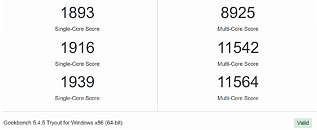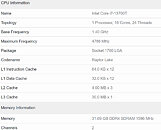- Joined
- Oct 9, 2007
- Messages
- 47,452 (7.50/day)
- Location
- Hyderabad, India
| System Name | RBMK-1000 |
|---|---|
| Processor | AMD Ryzen 7 5700G |
| Motherboard | ASUS ROG Strix B450-E Gaming |
| Cooling | DeepCool Gammax L240 V2 |
| Memory | 2x 8GB G.Skill Sniper X |
| Video Card(s) | Palit GeForce RTX 2080 SUPER GameRock |
| Storage | Western Digital Black NVMe 512GB |
| Display(s) | BenQ 1440p 60 Hz 27-inch |
| Case | Corsair Carbide 100R |
| Audio Device(s) | ASUS SupremeFX S1220A |
| Power Supply | Cooler Master MWE Gold 650W |
| Mouse | ASUS ROG Strix Impact |
| Keyboard | Gamdias Hermes E2 |
| Software | Windows 11 Pro |
As with every generation before it, Intel is preparing a line of 13th Gen Core processors with 35 W processor base power under the "T" brand extension. The Core i7-13700T retains the core-configuration of the i7-13700K (8P+8E), but with a much more aggressive power-management for commercial-desktop applications. Geekbench 5.4.5 scores of the processor were leaked to the web, where the processor was shown matching or beating the Core i5-12600K, a previous-generation 6P+4E core processor with much higher boost frequencies, and power limits.
The Core i7-13700T comes with nominal clock speeds of just 1.40 GHz, compared to 3.40 GHz of the i7-13700K, while its P-core maximum boost is probably 4.90 GHz, compared to 5.40 GHz of its enthusiastic sibling. The maximum boost frequency difference between the two SKUs may not seem like much, but the tighter power limits mean that the i7-13700T will hold on to boost frequencies in much smaller bursts. The chip is shown scoring 1939 points in the single-threaded test, and 11564 points in the multi-threaded one. In the ST test, the chip has sufficient power budget to boost one P-core to its maximum frequency, and so it's beating the i5-12600K with its 1856 ST score. In the multi-threaded test, it's slightly worse than the 11608 points of the i5-12600K. While it has more cores, there simply isn't enough power budget to run them at high frequencies. The Core i7-13700T likely won't be part of the first wave of 13th Gen Core SKUs, and will probably launch by late-2022 or early-2023.


View at TechPowerUp Main Site | Source
The Core i7-13700T comes with nominal clock speeds of just 1.40 GHz, compared to 3.40 GHz of the i7-13700K, while its P-core maximum boost is probably 4.90 GHz, compared to 5.40 GHz of its enthusiastic sibling. The maximum boost frequency difference between the two SKUs may not seem like much, but the tighter power limits mean that the i7-13700T will hold on to boost frequencies in much smaller bursts. The chip is shown scoring 1939 points in the single-threaded test, and 11564 points in the multi-threaded one. In the ST test, the chip has sufficient power budget to boost one P-core to its maximum frequency, and so it's beating the i5-12600K with its 1856 ST score. In the multi-threaded test, it's slightly worse than the 11608 points of the i5-12600K. While it has more cores, there simply isn't enough power budget to run them at high frequencies. The Core i7-13700T likely won't be part of the first wave of 13th Gen Core SKUs, and will probably launch by late-2022 or early-2023.


View at TechPowerUp Main Site | Source




 it's like comparing 5800H to 5600x
it's like comparing 5800H to 5600x 



